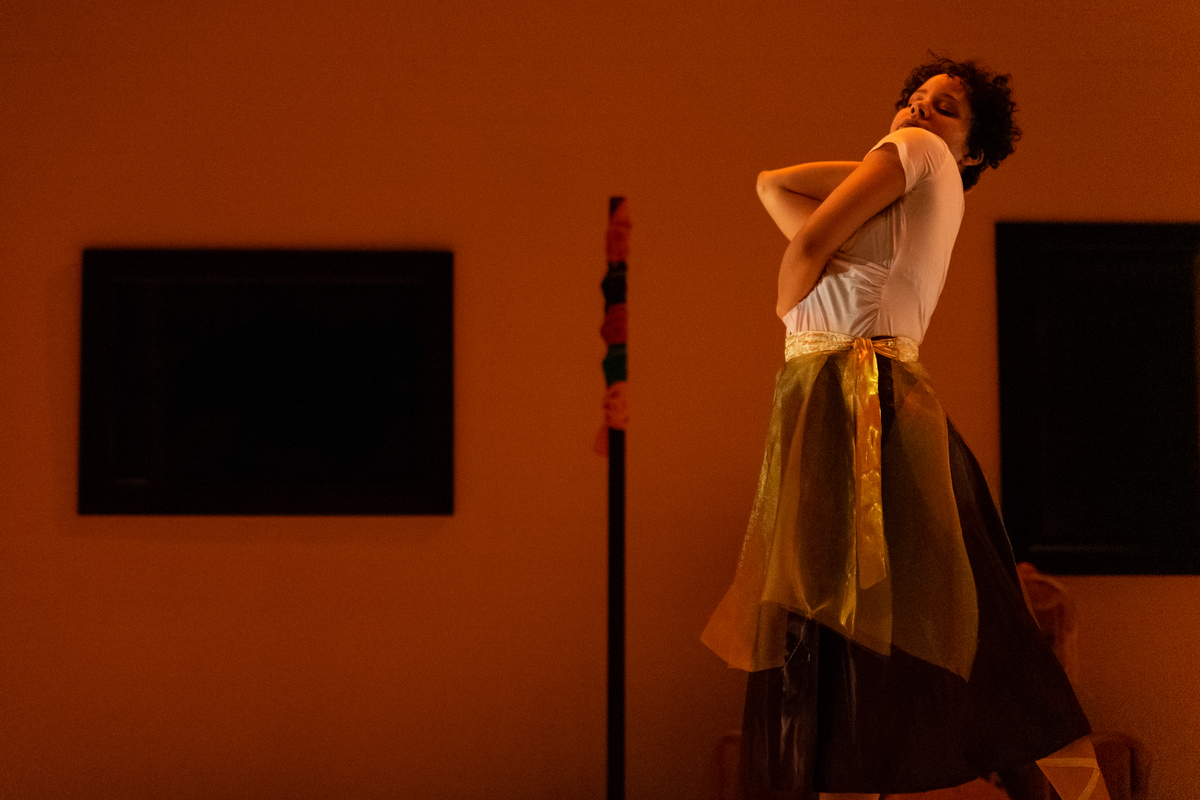The night displayed profoundly emotional and deeply personal journeys, demonstrated through the mediums of sound and dance.
On the evening of Valentine’s Day, Been Ready, a performance brought to the Portland Institute for Contemporary Art by Rejoice! Diaspora Dance Theater embodied choreography descriptions that transported the audience into the souls of the performers.
The performance, “(Un)easy,” was choreographed by Bethany Harvey in collaboration with dancers. Harvey and Annie Miteva took the audience through two variant perspectives on how depression and anxiety can manifest and show up differently for people.
Harvey and Miteva walked the path of being broken, isolated, beaten down and stigmatized, to finding freedom through what felt impossible by loving themselves, accepting their flaws and connecting with their self-identified communities.
The precise movement of their bodies, sometimes in unison but often disjointed, expressed the complexity and arduous task of navigating their emotions and stigma while searching for culturally relevant mental health support.
“Shaped,” choreographed by Michael Galen, was a performance to remember. Featuring Galen, Decimus Yarborough, Jamie Minkus, Saqualla Q Allen and Nekicia Luckett, the movement spread across the entire stage.
The dancers opened or took space on the floor, displaying the systemic weight that people carry in parallel experiences because of bias. The inability of many that hold privilege to see through the eyes of someone different than themselves creates a world filled with inequity and suffering, the information on the performance explained.
“When I Dare to be Powerful,” choreographed by Jamie Minkus in collaboration with dancers, sent chills down the audience’s spines. Minkus, Oluyinka Akinjiola, Brianna Gordon, Bethany Harvey and Mari Scharf stood evenly spaced across the stage, their bodies shaking while shouting, “did I cause this?” “was this my fault?” “was I showing too much skin?”.
For survivors of sexual assault and interpersonal violence, this expression of pain, loss, sorrow, fear, turning into joy, self-expression and love is a gift few give to the world. For Minkus, “the process has been surprisingly healing.”
As their painful journey continued, the women began to aggressively run their hands over the limbs of their body, it was “like your body betrayed you,” Minkus said. “I didn’t ask for it, I did nothing wrong. I am a woman, a human. Humans are sexual beings. We continually perpetuate the dehumanization of women.”
This culture tells us, “If we are [sexual], we deserve to get raped, or we deserve to get beaten. We arrest the way we choose to behave, the way we dress, how we act, in order for them to give us the responsibility of being the custodians of everyone else’s ethics,” Minkus said. As the dance continued the women began to learn to love themselves, glancing in the mirror, wearing clothing that emboldened and gave them strength.
“My truth is being a rape survivor and domestic abuse survivor. It was something I was so ashamed of that I wouldn’t claim it. Just because it happened doesn’t mean it’s over, we carry it our entire lives.”
In closing, the women placed drab tan fabric over their bodies. They looked down upon themselves, ripping through the confinement to expose colorful clothing, rejoicing in their ability to persevere.
“Black On All Sides: Freedom From Your Presumptions” was a strong display of courage, choreographed by Decimus Yarbrough in collaboration with dancers. As the production began, a man, Yarbrough, stood with a shackled leg, as he moved towards his dreams, only to be pulled backward.
Shortly thereafter, Yarbrough was joined by two men, Malik Delgado and Brandon Harrison, also shackled. As they navigate their lives together, supporting one another, they become empowered and find the confidence to remove the shackles.
The final piece, “Roots to Crown,” was choreographed by Oluyinka Akinjiola and cast by Latoya Lovely, Saqualla Q Allen, Nekicia Luckett and Bethany Harvey. The dance continued, energy being channeled by the Orishas, through the chakras to create bodily wholeness and interconnection, as stated in the program.
As they continued, examples of the many microaggressions Black women contend with were portrayed, followed by the words “code switch”. The Black women went on to demonstrate how they are forced to adjust to white cultural norms, through their language and behavior, as they navigate various situations throughout their daily lives.
In a compelling display of protest against “code switching”, the performers shouted “Not Today!” and the production came to a close.
Been Ready demonstrated the lived experiences of oppressed and marginalized individuals from their own perspective, in their own voices. It pleaded for a voice for the powerless and begged those with systemic power to use it for justice.
